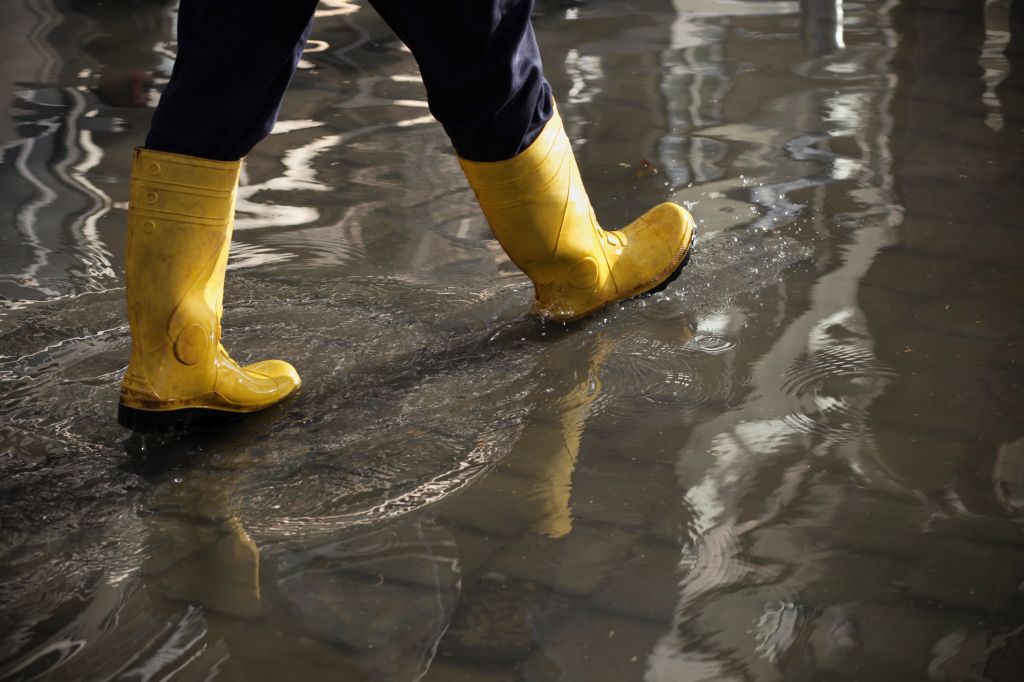Not only is it smelly and potentially harmful to your health, but a backup can also cause major damage to your home that’s difficult and costly to fix. You’re better off taking the necessary preventative measures to avoid a sewage backflow and, if it makes sense with your insurance coverage, opting in to sewer backup insurance. Here, discover the common causes of sewer backups, how to prevent them, and what to do if one does happen.
Key takeaways
-
A sewer backup happens when waste water and sewage flood back into your home.
-
It’s typically caused by a blockage in the pipes or a sewer system that gets overwhelmed during heavy rain or a spring thaw.
-
Bad odours and slow drains are two major signs of an impending backup.
-
There are many steps you can take to prevent sewer backups, including installing a backwater valve.
-
If waste water and sewage flood your home, don’t handle it yourself. Notify your insurance company immediately—especially if you have sewer backup insurance—and call in the pros.
What is a sewer backup?
A sewer backup, sometimes called a “sewage backup,” happens when waste water and sewage flows back into your home, instead of draining away from it. Dirty water and sewage may surge out of your drains, sinks, and/or toilets, covering your floors and damaging your basement or other areas of the home. It’s typically messy, smelly, and difficult to clean up, plus the waste water carries bacteria that can be hazardous to you, your family members, and pets. No one wants to deal with a sewer backup, and there are plenty of smart ways to prevent it.
What causes a sewer backup?
Here are several of the common reasons why sewer backups occur.
-
Your neighbourhood has seen heavy rainfall or a quick snow melt: If the sewer system becomes overwhelmed by water flow during a downpour or a spring runoff, it could cause a sewer backup in your home.
-
You’ve put or flushed foreign objects down the drain or toilet: There’s a long list of items that can clog the sink and toilet, including cooking grease, food scraps, tampons and pads, baby and/or intimate wipes (even if they’re labelled “flushable”), condoms, dental floss, paper towels, hair, and more.
-
You have a tree-root problem in your yard: Extensive root systems, especially of large, old trees, can break or block pipes.
-
Your sump pump has malfunctioned: Your sump pump is designed to drain the groundwater around your home to keep your basement dry. If it’s not properly installed, is too small for your basement, becomes clogged, or fails for some other reason, it can cause a sewer backup.
-
Your home’s sewer lines are old: Older homes typically have pipes made from cast iron and clay. Over time, they may corrode, crack, or even collapse.
What are the signs of an impending sewer backup?
You may not always get a warning (especially if there’s an unexpected downpour that affects the sewers in your neighbourhood), but you can still keep an eye out for these signs that mean something’s not quite right with your plumbing.
-
Bad odours: There’s a sewage smell emanating from your drains and/or toilets.
-
Bubbling or slow drains: The sinks and tubs in your home take a minute to clear, or air bubbles come up through the water.
-
Washing machine issues: Your washing machine doesn’t properly drain or causes nearby plumbing fixtures, such as the toilet or bathtub, to back up.
-
Weak toilet: Your toilet requires multiple flushes to clear toilet paper and waste, or it doesn’t clear properly at all.
How to help prevent sewer backups
Taking steps to prevent a sewer backup may save you a ton of time, money, and energy in the long run.
Outside your home
-
Redirect downspouts: They should be aimed at least three feet away from your home’s foundation and, ideally, six feet.
-
Set up rain barrels: Collecting rain in barrels prevents that water from rushing into the local storm sewer. You can use the water later on your lawn and/or garden.
-
Avoid non-porous landscaping near your home: Instead of concrete or asphalt, try sod, mulch, or flower beds, as they absorb water.
-
Disconnect downspouts and weeping tiles (that’s the drainpipe that surrounds your home’s foundation) from the city’s main drain: Allowing these fixtures to drain directly into the sewer can overwhelm the system during heavy rain or spring runoff.
Inside your home
-
Use drain catchers: Place catchers over the drains in your showers (for hair) and kitchen sink (for food bits).
-
Collect grease and coffee grounds: Oil, butter, margarine, and lard don’t belong down the drain, and neither do coffee grounds. Allow cooking grease to harden and then put it in your green bin. Coffee grounds can go in the green bin or be used for compost.
-
Only flush bodily waste and toilet paper: Nothing else should go in your toilet: not napkins, tissues, baby or cleaning wipes (even if they say they are “biodegradable” or “flushable”), cotton pads, paper towels, dental floss, pads or tampons, or condoms.
-
Install a sump pump: If you have a basement, but you don’t have a sump pump, you might want to get one, especially if your basement is prone to flooding, you live in an area with a lot of rain or snow, or your basement is nicely renovated.
-
Service your sump pump: Regular maintenance ensures that all of the sump pump’s parts are in good working order, and there are no clogs.
-
Stay on top of plumbing issues: Bring in a plumber ASAP, if you notice any warning signs of a sewer backup.
Backwater valves
One final thing you can do to prevent a sewer backup is to have a licensed plumber install a backwater valve (usually) inside your home. The valve allows waste water to flow in only one direction: away from your home. If the street’s main drain becomes overloaded, and waste water starts flowing the wrong way, the valve will automatically flap closed, which prevents sewage from re-entering your home’s pipes.
If you are doing a basement renovation, consider installing a backwater valve at that time. It is much more cost effective and easy to install when the floor is exposed.
Before paying for the installation out of pocket, check if your city or municipality offers subsidies, rebates, grants, or other rewards for basement flooding and damage prevention. Installation might even save you money on your home insurance premium.
Understanding your insurance coverage
One often-overlooked factor leading to sewer backups is the presence of rainwater. Even though rainwater originates from outside the home and could result in a sewer backup, it may fall under the category of “overland water claims.” Having comprehensive water coverage (both overland water and sewer backup coverage) should be considered to ensure your home is adequately protected. Speak with an insurance advisor to understand the types of coverage that are best for your home.
What to do in the event of a sewer backup
If the worst happens, and waste water and sewage enter your home, there are several steps you’ll want to take right away.
-
Don’t touch it: Even if the water looks fine, it’s contaminated with harmful bacteria. If you do come in contact with it, thoroughly wash your hands and clothes.
-
Open windows and doors: Try to ventilate the area as much as possible.
-
Stop using all of your plumbing: Don’t flush the toilets or wash anything down the drains.
-
Contact your utility companies: Depending on the level of flooding, you may need to have your water, gas, and electricity shut off.
-
Call your insurance company: Tell them about the issue as soon as possible. If you have sewer backup coverage, they may be able to recommend professionals who can help.
-
Bring in the experts: Don’t attempt to clean up the area yourself. Waste water and sewage need to be handled by trained pros.
Speak with an RBC insurance advisor to learn about Sewer Backup Endorsements for your home insurance if you’re worried about sewage and waste water backing up into your home, and how you would cover the losses as a result.
Great Rates and Expert Advice on Home Insurance
Get a free online quote* for coverage to protect you, your property, and your belongings from the unexpected.
*Home and auto insurance products are distributed by RBC Insurance Agency Ltd. and underwritten by Aviva General Insurance Company. In Quebec, RBC Insurance Agency Ltd. Is registered as a damage insurance agency. As a result of government-run auto insurance plans, auto insurance is not available through RBC Insurance in Manitoba, Saskatchewan and British Columbia.
This article is intended as general information only and is not to be relied upon as constituting legal, financial or other professional advice. A professional advisor should be consulted regarding your specific situation. Information presented is believed to be factual and up-to-date but we do not guarantee its accuracy and it should not be regarded as a complete analysis of the subjects discussed. All expressions of opinion reflect the judgment of the authors as of the date of publication and are subject to change. No endorsement of any third parties or their advice, opinions, information, products or services is expressly given or implied by Royal Bank of Canada or any of its affiliates.
Share This Article
Read This Next








